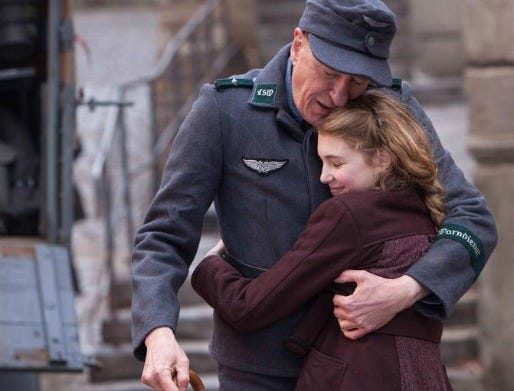The Book Thief

We can never run out of World War II films because it was the most transformative event in recent history and, possibly, the entirety of human existence. A movie about the war could be released every day for the rest of my life, and we still would never have adequately captured the extent of human misery compressed into those six years.
Certainly, I would never tire of them.
“The Book Thief” comes at the war from the perspective of an intelligent, sensitive German girl who comes to live with her foster parents in a small village. The war, seemingly distant and only distasteful, comes to relentlessly dominate the lives of the townspeople. While many knuckle under the Nazi regime, children like Liesel and a few brave adults find ways to stand up without getting knocked down.
Director Brian Percival and screenwriter Michael Petroni, adapting the award-winning book by Markus Zusak, go for a straightforward approach — focusing on the children with the grown-ups occupying the background. The result is simple, plaintive, a bit on the sappy side but also burning brightly with heartfelt emotions.
The performances really push the experience, especially young French-Canadian Sophie Nélisse as Liesel and Geoffrey Rush as her foster father, Hans. Emily Watson also shines as her churlish foster mother, Rosa, though it’s a less showy part.
Roger Allam provides the seductive, slithery voice of Death, who narrates the proceedings and claims many victims throughout the course of the story. The first is Liesel’s brother, who dies along their journey to their new foster parents. At the hasty funeral, she steals her first book, a guide to grave digging — something that eventually becomes her signature habit.
Her greeting upon being presented to her foster parents is huffy indignation from Rosa, who was expecting two children — and the commensurate stipend from the state that came with them. She’s a harsh disciplinarian and treats Hans with the smallest measure of kindness possible.
Hans is quite a character, a shy, passive man who accepts his wife’s many abuses without complaint but secretly harbors the soul of an artist. His only real talent is with the accordion and his working life is spotty at best.
He becomes Liesel’s guardian angel and supporter, quietly encouraging her rebellious ways. She begins sneaking into the library of the town’s burgermeister to read his books — later, with the tacit approval of his wife. When the Third Reich begins holding rallies in town, she scavenges a charred book from the pile that has been burned as too dangerous for people to read.
Liesel’s journey from girl to woman takes a big step when a young Jewish man, Max (Ben Schnetzer), shows up on their doorstep looking for refuge. The son of a man who saved Hans’ life during the First World War, he is ensconced in the basement as their hideaway and Liesel’s secret tutor.
She also finds a strange allure to Rudy (Nico Liersch), the boy who lives next door, and they form a relationship that’s part friendship, part rivalry and the chaste beginnings of an adolescent romance. The very picture of Aryan youth, Rudy is a star athlete who draws the eye of Nazi recruiters, but he secretly idolizes Jesse Owens.
I enjoyed “The Book Thief” and its performances, though the film carries a sort of restrained reverence for its subject matter that is a little maudlin. Still, here’s another wonderful tale from amidst the horror.
4 Yaps



